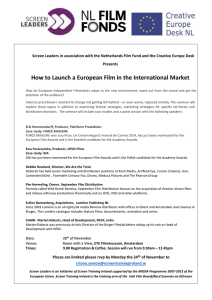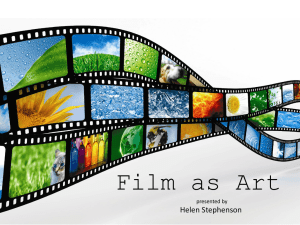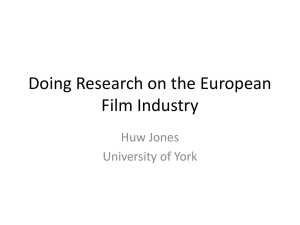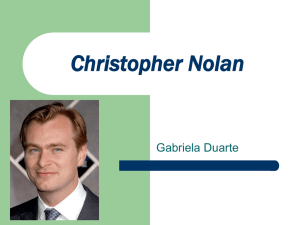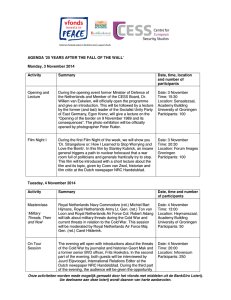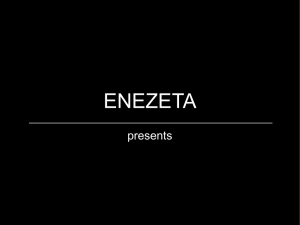FILM - Humanities
advertisement
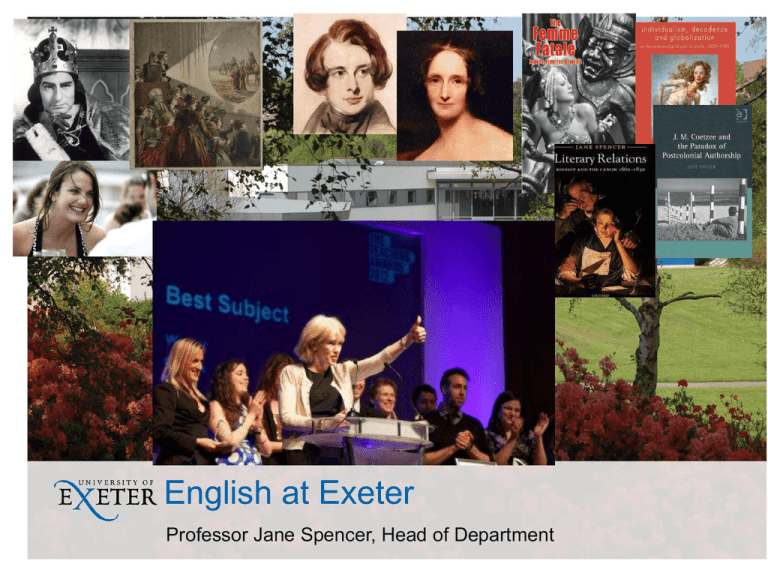
English at Exeter Professor Jane Spencer, Head of Department Exeter English: Choice, range, and flexibility •60 modules a year, covering everything from Chaucer to modern digital culture •Creative writing and film options within the English programme •Study Abroad opportunities •The option of 25% of your studies in a non-English discipline each year Exeter English: World-class teaching •56 specialists involved in undergraduate teaching from 2013 – and still growing. •Diversity of interests and backgrounds. •Our success in attracting students means we can continue to invest more in teaching and study resources. Exeter English: World-class research •In the last UK research rankings (2008), Exeter English was ranked 1st in the UK for world class research •Our research enhances the quality, dynamism and diversity of our teaching Degree programmes BA English BA Film Studies BA English with Study in North America BA English with Study Abroad BA English and Film BA English and Classical Studies BA English and Modern Languages* BA English and Visual Culture BA English and Drama Flexible Combined Honours * Spanish, French, German, Italian or Russian Valuing our students’ views • We review and discuss student feedback on all modules • We discuss changes to our programme with students before implementation • We also review The National Student Survey (NSS) results - the judgment of our graduates • The Students’ Guild Teaching Awards: inspiring innovative teaching Looking after the future •In 2011-12, 91% per cent of English graduates were in job or further study, within 6 months of graduating •Exeter provides over 900 employment focused events a year •A work experience module is offered at level 2, as part of your degree. •The University offers professional careers advice and runs schemes (e.g. Exeter Award) which help you build a CV and relevant experience. In 2013: • 93% of English graduates were satisfied with their degree • 95% believed it intellectually stimulating • 96% were awarded a 2:1 or better English on the Penryn campus • Different campus, same department, similar programme • Approximately 70 students per year group • In 2013, of our Penryn students: 95% found their degree intellectually stimulating 100% were in work 6 months afterwards (source: NSS) Studying English at Exeter Dr. Corinna Wagner, Admissions Tutor The English degree Year 1: The Platform (Compulsory modules on critical theory, research and writing skills, literary history to 1800, and The Poem. Options in Film, Creative Writing, The Novel and Shakespeare) Year 2: Breadth and Depth (choose 4 of 12 period-based literature, film or creative writing options) Year 3: Specialisation and Fulfilment (Dissertation, choose 1 of 3 core option modules, 2 of 35+ specialist options) English in the 2nd year Choice of 4 of the following, 2 from pre-1800: Chaucer and his contemporaries Desire and Power: English literature 1570-1640 Renaissance and Revolution: 17th-century literature Theatrical Cultures, Renaissance to Restoration Satire and the City: English literature 1660-1750 Introduction to American literature Revolutions and Evolutions: 19th-century literature Modernism & Modernity: Literature 1900-1960 Crossing the Water: Transatlantic Literary Relations Shots in the Dark (FILM) Spectacular Attractions (FILM) Finding a voice (CREATIVE WRITING) Humanities in the Workplace (EMPLOYABILITY) 3rd year special options (a selection) •Romance in the Age of Chaucer •Performing Digital Humanities •Spectacular Bodies: Shakespeare •Literature and Anti-Literature •Charles Dickens •Jane Austen •Hardy and Women Who Did •James Joyce's Ulysses •India Uncovered •Antique Romans •After Elizabeth •The Gothic •Imperial Encounters •American Childhoods •Crime & Punishment •Myths of Nation / Postcolonial Literatures •British Poetry of the First World War •The Graphic Novel •Classics of Children's Literature •The American Novel Since 2000 •Chamber of Horrors •Digital and Cyberculture Studies •Advanced Critical Theory •Serious Play (CW) •Short Fiction (CW) •Life-Writing: History, Form, Practice (CW) •Writing the Short Film (CW) •American Independent Film (FILM) •Cityscapes (FILM) •The Animated Film (FILM) •Film & Literature (FILM) Beginnings, 1st year Syllabus: 1. 2. 3. 4. 5. 6. 7. 8. 9. 10. 11. Stories of origin: extracts from Genesis and Atrahasis Homer, The Odyssey Beowulf (tr. Heaney) Sir Gawain and the Green Knight (tr. O’Donoghue) Robert Henryson, Moral Fables (tr. Heaney) Christopher Marlowe, Hero and Leander William Shakespeare, The Winter’s Tale John Milton, Paradise Lost, books 1, 2, 4, 9 Alexander Pope, The Rape of the Lock Jonathan Swift, Gulliver’s Travels Mary Shelley, Frankenstein Assessment: Critical analysis, 2 essays (1 reviewed in draft), group presentation, seminar participation Sample Syllabus, 2nd year: Modernism and Modernity 1. Modernist Manifestos 2. Urbanity: Joseph Conrad, The Secret Agent (1907) 3. Visual Culture: Ford Madox Ford, The Good Soldier (1915) 4. Modernist Subjectivity: T. S. Eliot, The Waste Land (1922) 5. Colonialism and Nationalism: James Joyce, Dubliners (1914) 5. Feminism: Virginia Woolf, To the Lighthouse (1927) 6. Regional Modernism: William Faulkner, As I Lay Dying (1930) 7. The 1930s, Class, Social Change: Jean Rhys, Voyage in the Dark (1932) 8. The Rise of Fascism: W. H. Auden, Poems 9. War and Fascism: Elizabeth Bowen, The Heat of the Day (1949) 10. After Modernism: Samuel Beckett, Endgame (1958) Sample Syllabus, 3rd year: Gothic Evolutions, Literature and Visual Culture 1: Art viewing: Piranesi, Goya, Fuseli, Friedrich, Blake 2: The Uncanny and Domesticity: E. T. A. Hoffmann, “The Sandman,” Freud, “The Uncanny” 3. Medicine, the Body and the Gothic: Samuel Warren, “Grave Doings”; Poe, “Ligeia,” short stories on anatomy, disease and epidemic 4. Science and the Monstrous: Hawthorne, “The Birthmark”; Mitchell, “The Case of George Dedlow”; Le Fanu, “Green Tea”; Machen, “The Inmost Light”; Wells, “The Stolen Bacillus” 5. Disability Theory and Difference: Dr Frederick Treves, Case Studies, film The Elephant Man 6: Degeneration: Bram Stoker, Dracula 7: Gender and Re-visioning Literary History: Angela Carter, The Bloody Chamber; 4. Film viewing, Let the Right One In 8. Darwin, Social and Biological Evolutionary theory: HG Wells, The Island Of Dr Moreau; Darwin, readings 9. Imperial Gothic: Ryder Haggard, King Solomon’s Mines 10: Race, Technology and the Gothic: Alan Moore, The League of Extraordinary Gentlemen Assessing the degree • Writing: coursework, exams (together approx. 70%+ of all assessment), creative writing portfolios, and the final dissertation. • Oral and team building: Group presentations, group wikis, class participation (level 1) • Final Degree = ⅓ level 2 + ⅔ Level 3 We value and encourage: creativity, independence, intellectual rigour, good verbal and oral communication. Supporting your Studies Minimum 10 weekly contact hours at level 1: Seminars and Workshops (1-2.5 hrs) Lectures (1 hour) In addition: Office Hours (10 mins - 1 hour) Film screenings Personal tutors offer regular academic and pastoral support Undergrad Writing Centre, Royal Literary Fund fellows The Forum, Library, Study Zones, Multimedia facilities YourExeter YourExeter is a website specifically for you – our College of Humanities offerholder. You can: •Find out even more about your subject •Hear from current students and staff All you need to log in to YourExeter is your email address and date of birth. humanities.exeter.ac.uk/undergraduate/yourexeter •Find useful tips about how to prepare for university •Ask any further questions
